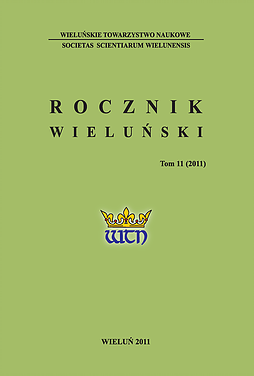Profesor Józef Jasnowski (12 III 1906–9 X 2009)
Professor Józef Jasnowski (12 III 1906-9 X 2009)
Author(s): Edward Alfred MierzwaSubject(s): Military history, Political history, Social history, Middle Ages, Recent History (1900 till today)
Published by: Wieluńskie Towarzystwo Naukowe
Summary/Abstract: Józef Jasnowski (1906–2009), the preeminent Polish historian, born in Sieniec (the Wielun district under the Russian rule). He studied history at the university of Warsaw, where he was profoundly influenced by professor Wanda Moszczenska (she was an expert from medieval history). He obtained the solid methodological foundation of medieval history. He wrote his master thesis the activity Faust Socyn in Poland, passed his Master’s degree in 1931, and was appointed an assistant of famous Polish historian professor Oskar Halecki. In 1933 he defended his doctoral thesis Peter of Goniądz the activity and writings. Study of history the religious movement in Poland in the second half of the XVIth century. As he said after years with good humor: “For such long title I ought to be awarded the doctorate”. In 1935 he was granted a scholarship of National Fund of Culture and went abroad. He gathered archival sources in Riga, Koenigsberg, Wien and Budapest produced his postdoctoral thesis: Nicholas Black Radzivill (1515–1565), that was presented in May 1939 to the faculty council in Warsaw University. An outbreak of war in 1939 destroyed his scientific career. Through Romania, where he spent a few months in an internment camp, Hungary and Yugoslavia, he sailed to France, where he came forward as a volunteer in Polish Army in France. After the collapse of France, he was evacuated to Scotland, where he served in the 11th signal company Polish Army. After two years of military serves, he was detached at disposal of the Ministry of Information of the Polish Government in Exile. In the February 1943 Jasnowski was appointed the clerk of Department Secondary Schools in Ministry of Education of the Polish Government. He was responsible for the planning of the primary and secondary level of teaching of Polish school children in Great Britain during the II World War, and the school textbook for history teaching. Simultaneously, on official order of the Polish Government, Jasnowski together with the representatives of Czech, Lusatia, Slovakia planed a new post-war political order. He was a co-editor of the international political magazine „West-Slavonic movement”, kept at ambitious level. After war, Jasnowski did not want to get back to after-Yaltan communist Poland. He decided to continue the scientific career in Great Britain. He was conscious of lack of the Polish libraries, that he was cut off from polish archives, and his financial situation was quite bad. But he believed, that in the future Poland would be free. It was a heroic decision! But he was not alone. He acted like many of the Polish soldiers and the Polish citizens. He again start with the scientific research. In 1948 Jasnowski printed in Oxford an excellent survey of the most important problems of Anglo-Polish relations in the XVIth and the XVIIth century – England and Poland in the XVIth and the XVIIth centuries. He studied the history of Poland in the Central European historical and social context and published his findings in the book: Polska w zasięgu cywilizacji arabskiej (Poland in the range of the Arabian influences). He came back to the registration and conferment procedure for a post doctoral degree. In the 1952 he start with the postdoctoral degree conferral procedures. 1953 the 20 of April the Ministry of Education of the Polish Government on Exile, approved his title of Scientific Doctor. In 1955 professor Jasnowski received an invitation to the participation in the International Congress Historical Sciences in Rome. But the disease deprived him of the possibility of participation in the Congress. His paper Problems of the Frontier with Steppes of the North Black Sea, was presented and was issued in “Antemurale” 1955, vol VII. In 1960 his paper Eastern Europe and Western Travelers during the Period of the Grand Tour was presented too on the International Congress Historical Sciences in Stockholm. Jasnowski three times gave a speech at a congress’ of Polish Culture (1970, 1985, 1995). When he was almost 90 years old, he edited eight volumes Materiały do dziejów polskiego uchodźstwa niepodległościowego 1939–1990 (The source materials to the history of Polish pro-independence exiles 1939–1990 and three volumes Prace III Kongresu Kultury Polskiej na Obczyźnie (The Works of the Third Congress of Polish Culture on Exile). In 1991 he was elected as the regular member of Polish-Scandinavian Researches Institute in Copenhagen. Jasnowski died in Kenley (Surrey) in England on 9th October, 2009.
Journal: Rocznik Wieluński
- Issue Year: 11/2011
- Issue No: 11
- Page Range: 103-118
- Page Count: 16
- Language: Polish

